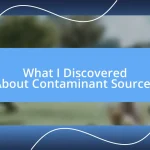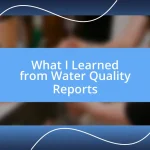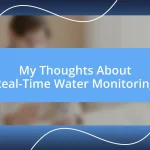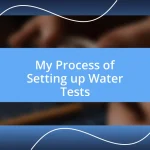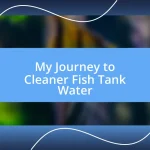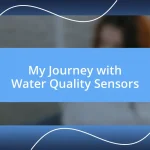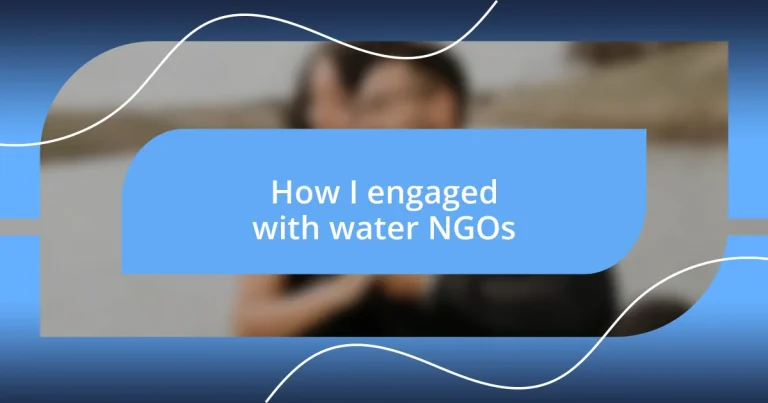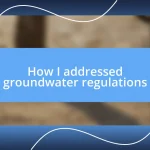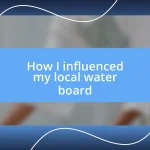Key takeaways:
- Building relationships with NGO leaders through informal meetings and community events fosters trust and a deeper understanding of their challenges and successes.
- Volunteering offers hands-on experiences, allowing individuals to contribute meaningfully, empower communities, and raise awareness about water issues.
- Sharing success stories and personal narratives inspires engagement and collaboration, galvanizing community support for future water initiatives.
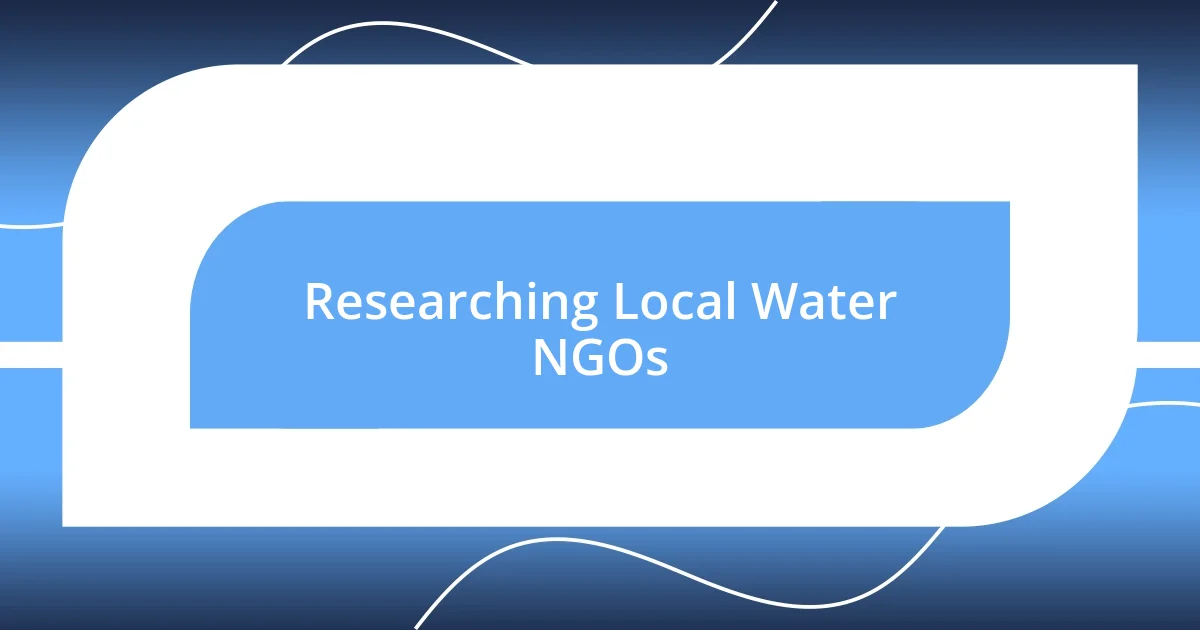
Researching Local Water NGOs
When I first started researching local water NGOs, the sheer number of organizations was overwhelming. I remember scrolling through countless websites, wondering which ones were truly making an impact. Isn’t it fascinating how some groups are integral to their communities, working tirelessly but quietly, often without the recognition they deserve?
One afternoon, I stumbled upon a local NGO that focused on rainwater harvesting in rural areas. The stories they shared about families finally accessing clean water moved me deeply. I realized then that looking beyond the surface was crucial; it’s about understanding the personal narratives that drive these organizations and the communities they serve.
I also found that attending community meetings could be incredibly revealing. It was such a powerful experience to hear firsthand how local efforts were providing sustainable solutions to water scarcity. Have you ever stood in a room filled with passionate voices, all aiming for the same goal? That collective energy made me appreciate the importance of connecting with these NGOs on a deeper level.
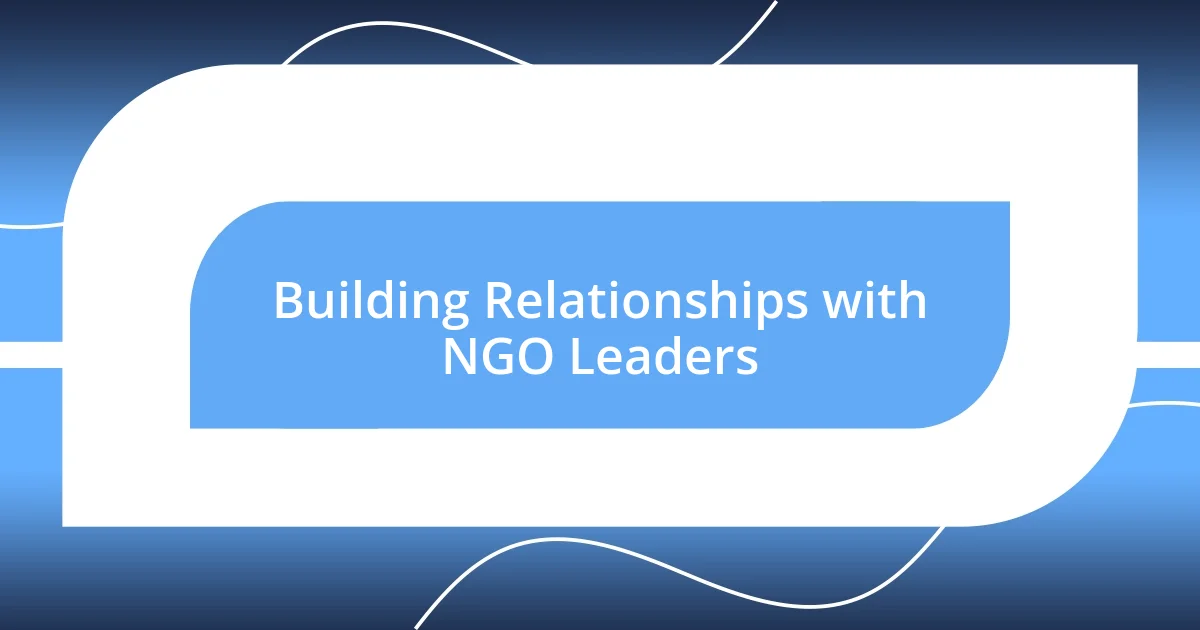
Building Relationships with NGO Leaders
Building relationships with NGO leaders requires genuine engagement and trust. I remember my first visit to a local water NGO’s headquarters. The atmosphere was warm and welcoming; over cups of freshly brewed coffee, I had the chance to share ideas and insights about sustainable water practices. It was during these informal chats that I learned about their challenges and triumphs—those unfiltered moments provided invaluable perspective, making me feel like a part of their journey.
I’ve found that participating in community events can be a game-changer. One memorable experience was when I joined a cleanup drive organized by an NGO. The leader shared stories of their commitment to improving local water sources, and I saw firsthand the impact of their efforts. Those moments were pivotal—they not only deepened my admiration for their work but also allowed me to form bonds that would last well beyond the event.
Additionally, reaching out for collaborations can foster stronger ties. I proposed a workshop to enhance skills related to water conservation, and the enthusiasm I received was palpable. The joy of striding alongside these passionate leaders, brainstorming ways to achieve common goals, was inspiring. Isn’t it rewarding to see ideas morph into action when people come together for a shared cause?
| Engagement Method | Impact |
|---|---|
| Informal Meetings | Foster personal relationships and trust |
| Participation in Events | Build community and shared experiences |
| Proposing Collaborations | Encourage innovative ideas and joint initiatives |
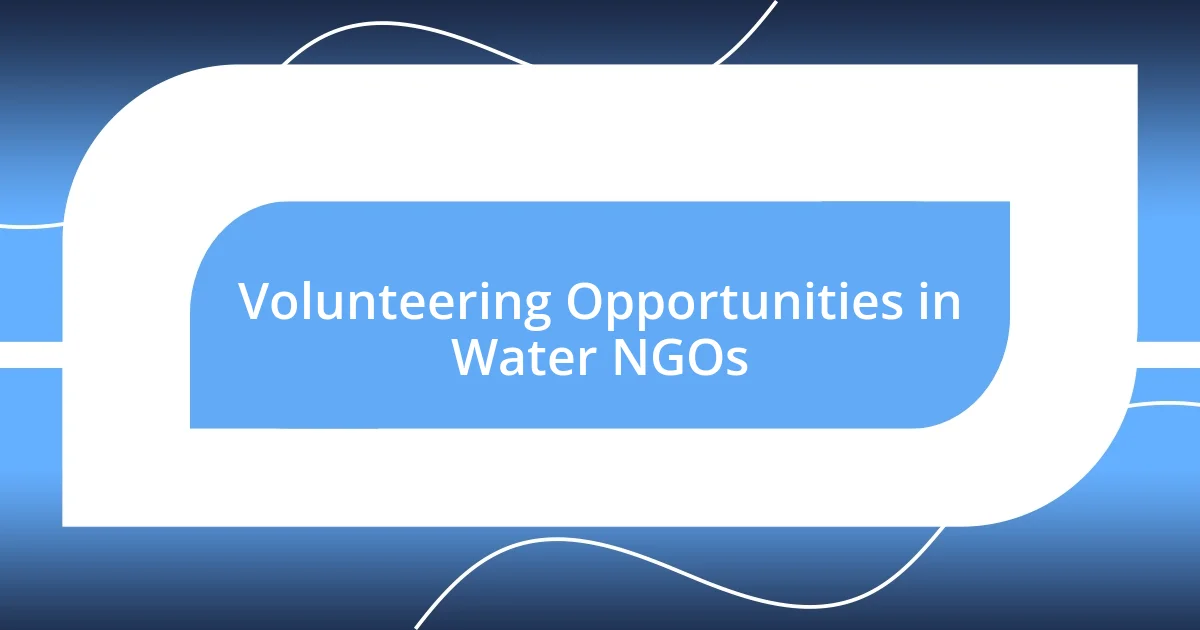
Volunteering Opportunities in Water NGOs
Volunteering with water NGOs can be a transformative experience, as each role presents unique opportunities to make a real difference. I fondly recall my first day volunteering for an organization focused on clean water access. I was assigned to help with outreach, and it truly opened my eyes to the challenges faced by families in our community. Listening to their stories while handing out educational materials filled me with a profound sense of purpose. It struck me how even small contributions could lead to meaningful change, making the experience deeply rewarding.
Here’s a glimpse of what volunteering might look like within water NGOs:
- Community Education: Assist in workshops that teach families about water conservation techniques.
- Fieldwork: Participate in projects like well construction or maintenance to ensure clean water access.
- Fundraising Events: Help organize and promote events that raise funds for ongoing projects, thus contributing to the NGO’s sustainability.
- Social Media & Marketing: Create content to raise awareness about the NGO’s mission and projects, reaching a broader audience.
- Research Assistance: Collaborate on data collection efforts regarding local water sources and needs to inform future initiatives.
Engaging with these organizations not only deepens your understanding of water challenges but also creates bonds with passionate individuals who share the same vision for a better world. Each experience has the potential to enrich your life in ways you may never anticipate.
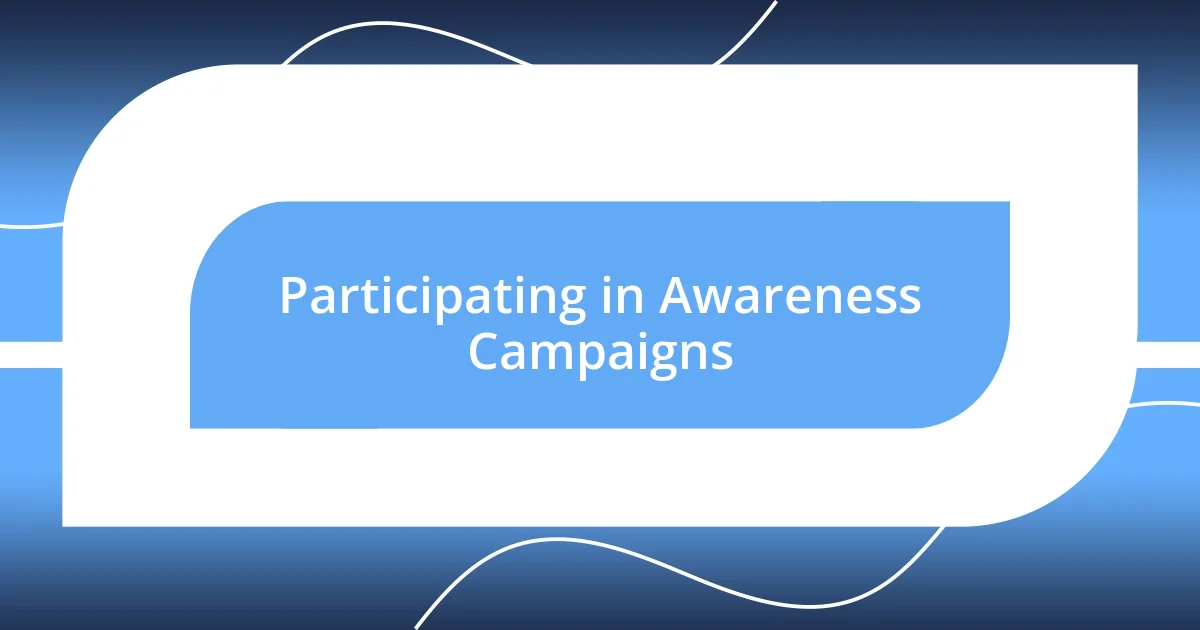
Participating in Awareness Campaigns
Participating in awareness campaigns has been an eye-opening experience for me. I remember joining a local water conservation walk one sunny afternoon. As we marched through the streets, holding signs and sharing facts, I felt a surge of collective energy. It struck me how so many people were invested in the same mission, and our voices became a chorus of change. Have you ever felt that kind of unity in a cause? It’s an exhilarating reminder that together, we can amplify our impact.
During one campaign, we set up a booth in the town square to educate the public about the importance of clean water. I was tasked with handing out flyers, but as I engaged with passersby, I realized an opportunity to connect on a deeper level. Listening to their concerns about local water issues not only made them feel heard but ignited passionate discussions about solutions. Through these conversations, I understood that awareness isn’t just about transmitting information—it’s about fostering community dialogue and sharing personal stories that resonate with others.
Another unforgettable moment unfolded during a weekend festival dedicated to water awareness. I volunteered to facilitate a workshop on the importance of saving water at home. As I spoke to the eager participants, I could see their eyes light up with newfound knowledge. Sharing practical tips on reducing water waste felt incredibly fulfilling; it was as if I was planting small seeds of change in each person’s mind. Isn’t it amazing how a simple conversation can inspire action? Through these interactions, I’ve learned that raising awareness is not merely a task—it’s about instilling hope and empowering individuals to make a difference, one small step at a time.
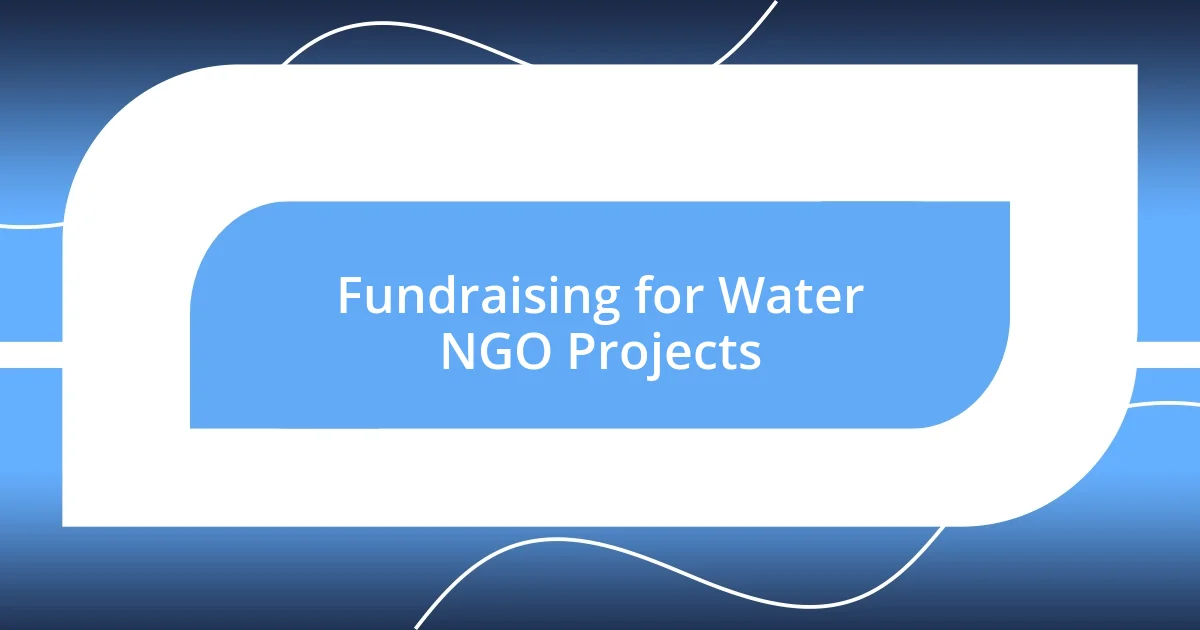
Fundraising for Water NGO Projects
Fundraising for water NGO projects is not just about collecting donations; it’s about building a community of supporters who genuinely care. I remember my first fundraising event for a water NGO, where I stood in front of a small group sharing stories of families who lacked access to clean water. The poignant moment came when a donor asked how their contributions would directly impact those families. It made me realize that transparency and connection are crucial in fundraising efforts.
In one remarkable instance, we organized a charity run to raise funds for a new well in a rural area. The energy was electric as participants donned matching shirts, and I could feel a shared sense of purpose. I enthusiastically reached out to local businesses for sponsorships, and their willingness to support the cause was heartwarming. Have you ever seen a community come together like that? It’s inspiring to witness the ripple effect of collective effort, showing how even small contributions can lead to significant change.
On a more intimate scale, I also turned to social media to engage friends and family in fundraising efforts. I shared personal stories, along with photos from our projects, inviting them to join the cause. The emotional responses I received were powerful—people began to share my posts, spreading awareness beyond my immediate circle. It struck me how easy it can be to inspire others when you connect with them emotionally. Fundraising, I learned, is not just about the final dollar amount; it’s about creating a narrative that fosters empathy and encourages further involvement.
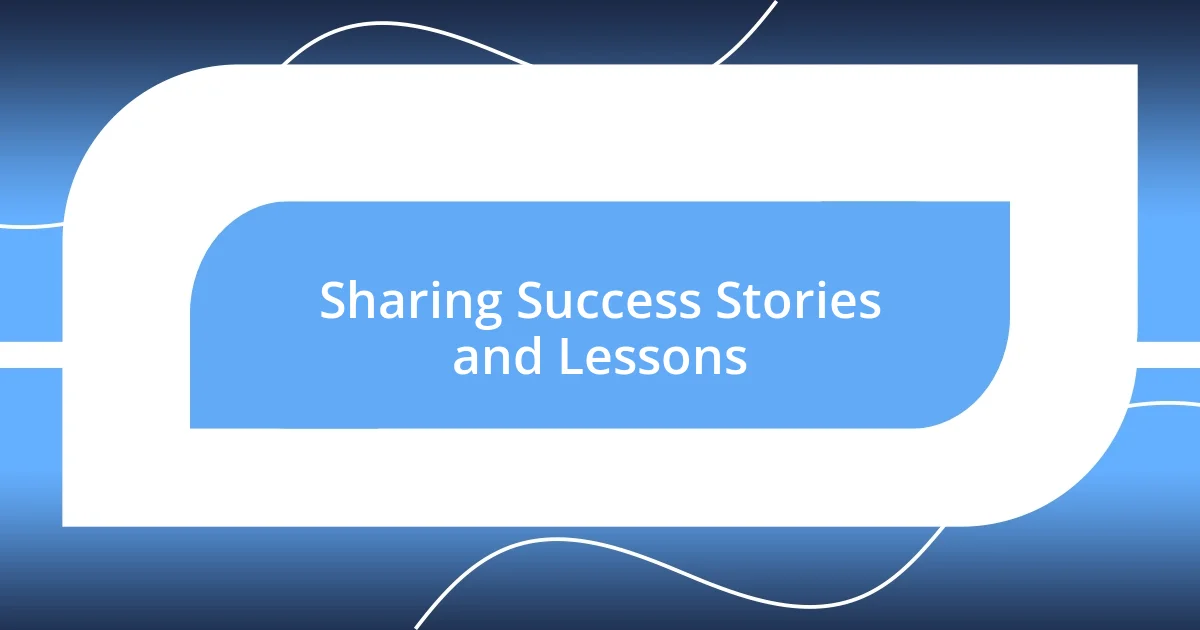
Sharing Success Stories and Lessons
Sharing success stories can be a powerful tool for inspiring action within the community. I vividly recall attending an annual meeting where a representative from an NGO shared firsthand accounts of how our combined efforts provided clean drinking water to several villages. Each story was filled with emotion, and I could see the faces of those benefited by our initiatives projected on the screen. Isn’t it amazing how storytelling can transform statistics into relatable human experiences? Hearing how our contributions directly improved lives motivated everyone in the room to engage even deeper.
An experience that stands out to me was when we created a video documenting a water sanitation project. After a friend and I interviewed local families, we were overwhelmed by their gratitude and joy. This footage conveyed the tangible impact we were making, and it became a powerful tool for future fundraising. I shared this video at a community event, and people who had previously been indifferent sat up, inspired. It’s incredible to witness how personal narratives can spark interest and drive change, isn’t it?
Moreover, I began to notice a pattern: when success stories were shared, people came together to brainstorm innovative ideas for future projects. After presenting a successful well installation, a fellow volunteer suggested another initiative to address irrigation needs in local gardens. The collaborative energy was infectious, highlighting that sharing our experiences encourages a sense of ownership among team members. It made me realize that each success story isn’t an ending; rather, it’s a stepping stone toward greater community engagement and sustainability.

